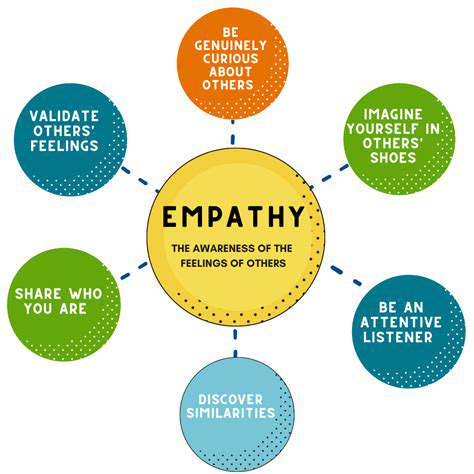Best Balanced Parenting Strategies for Modern Families
Promoting Emotional Well-being and Resilience
Cultivating Emotional Intelligence in Children
Nurturing emotional intelligence in children is a cornerstone of balanced parenting. This involves helping them understand and manage their own emotions, as well as recognizing and responding to the emotions of others. It's not just about teaching them to 'be happy,' but empowering them to navigate the full spectrum of human experience with awareness and empathy. This includes providing opportunities for open communication, validating their feelings, and teaching healthy coping mechanisms for stress and frustration, all while demonstrating emotional regulation in our own actions. By fostering emotional intelligence, we equip children with the tools they need to build resilience and thrive in various life situations.
A crucial aspect of emotional intelligence is recognizing different emotional responses. Parents can actively model healthy responses to various triggers. This involves acknowledging our own emotions, discussing them with children, and demonstrating how to express them constructively. By doing so, we create a safe space for children to explore their feelings without judgment, fostering a sense of emotional safety and security within the family dynamic.
Building Resilience Through Challenges
Resilience is the ability to bounce back from adversity. Children face challenges daily, from minor frustrations to significant setbacks. Promoting resilience involves helping them develop coping mechanisms to navigate these challenges effectively. This includes teaching them problem-solving skills, encouraging a growth mindset, and fostering a sense of self-efficacy—the belief in their ability to succeed. By supporting children through difficult times, we empower them to view challenges as opportunities for growth and learning, fostering a sense of strength and determination. This is a critical component of balanced parenting.
Building resilience is not just about teaching children to handle disappointment; it's about creating a supportive environment that encourages them to try new things, learn from mistakes, and persevere through setbacks. A key element is celebrating small victories and acknowledging their efforts, which reinforces their belief in their capabilities and builds self-confidence. This continuous support fosters a strong sense of self-worth, a crucial ingredient in developing resilience.
Fostering a Supportive and Loving Environment
A supportive and loving environment is fundamental to fostering emotional well-being and resilience in children. This includes creating a safe space where children feel loved, accepted, and understood, regardless of their actions or feelings. Open communication channels are essential, allowing children to express themselves freely and openly without fear of judgment or punishment. Consistent routines, clear boundaries, and predictable expectations provide a sense of security and structure, which in turn helps children navigate the world with confidence.
Active listening and empathy from parents demonstrate that their feelings are important. This creates a strong emotional connection, enabling children to feel supported and validated. This supportive environment also includes nurturing their interests and hobbies, fostering a sense of belonging, and providing opportunities for social interaction. By creating a loving and secure environment, we equip children with the emotional strength and resilience needed to thrive.
Consistent positive reinforcement and celebrating achievements, no matter how small, are crucial. This reinforces positive behaviors and boosts self-esteem. This constant affirmation, combined with creating a safe space for vulnerability, helps children develop emotional intelligence and resilience, essential components for navigating life's complexities.
Openly discussing feelings, both positive and negative, helps children understand their emotions and develop healthy coping mechanisms. This helps them to identify and label their emotions, which is a vital step in their emotional development. A supportive and loving environment allows children to feel safe enough to express their emotions without fear of judgment or criticism.
Read more about Best Balanced Parenting Strategies for Modern Families
Hot Recommendations
- Top Methods for Instilling Self Discipline in Children
- Balanced Parenting Methods for Family Success
- Creative Ways to Practice Communication Skills with Your Child
- How to Create a Stimulating Early Learning Environment
- How to Use Play Therapy for Special Needs Child Education
- How to Teach Children About Budgeting and Saving
- How to Engage Kids with ADHD in Effective Learning
- Innovative Positive Discipline Methods for Busy Families
- Best Adversity Quotient Building Exercises for Children
- Techniques for Effective Communication with Special Needs Children











